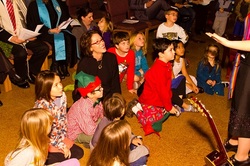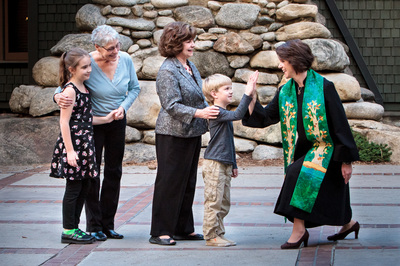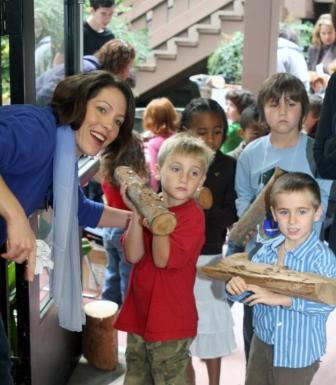Faith Formation and Multigenerational Ministry

“The purpose of education in this school of thought is not to impart knowledge, for the most important knowledge is already within. The purpose of education is to guide the child’s behavior into harmony with the truths the child already knows, encouraging the innate urge toward goodness and kindness.” ~ Jeanne Nieuwejaar, The Gift of Faith: Tending the Spiritual Lives of Children
Religious Education exists in so much more than Sunday morning classes; it is in all that we do. It is our worship, our fellowship, our community, and our social justice. Religious education is our experience of church, faith, and life as they converge together. As UU's we often get hung up on our intellectualism, which is an important part of our history and from which we need not run, but it also need not be so compartmentalized. Religious Education is religious when it speaks to our inner selves—our minds and hearts and bodies, as well as to our place in the world. We need not “teach” people faith and religion We explore it together, we get in there with them and struggle. When we are engaged, they are engaged, and transformation begins. When one of us (known or unknown) is suffering and struggling, we all suffer and struggle. But we have the power to create joy and affect change, and that power multiplies exponentially when we use it collectively and multigenerationally.
In my years as a Religious Educator, my experience of Religious Education has shifted from one often more focused on programmatic elements—curriculum, projects, events—to one focused more intentionally on creating community. As a DRE, it is easy to get side-tracked and hung up on the details and specific content of Religious Education rather than taking the longer view of the “why.” Why do we come to church? Why are we here? What is our purpose together? Creating a spiritual community serves as the highest expression of our Unitarian Universalist identity and it centers around relationships and sacred space. Inspired by the book The Gift of Faith by Rev. Jeanne Harrison Nieuwejaar, my philosophy of Religious Education has always been, “To Transmit Our Faith,” to create a space of engagement that builds a community of radical inclusion and welcoming, a community that invites questions, play and self-reflection, an environment that shares our rituals and language and vision for the world. The specific learning will come, but it need not be the focus. How we “show up” for one another and model for children and youth to do the same creates a foundation of intimacy, trust, and community pointed toward that goodness.
As a minister, I will have the privilege of creating the container for this kind of community to flourish, one that celebrates Faith Formation at all levels, and that reminds people what beloved community looks like, even when it feels challenging. Informed by my own theology, grounded in love and relationship, I can work alongside a DRE to support a vision of Religious Education and congregational life that embodies those concepts. We can “transmit our faith” in many ways both inside and outside the church—it is a whole community endeavor. I want the children and youth in my future congregation (and even now) to know they have a minister, along with many trusted adults, to whom they can turn in times of sorrow and joy.
Religious Education exists in so much more than Sunday morning classes; it is in all that we do. It is our worship, our fellowship, our community, and our social justice. Religious education is our experience of church, faith, and life as they converge together. As UU's we often get hung up on our intellectualism, which is an important part of our history and from which we need not run, but it also need not be so compartmentalized. Religious Education is religious when it speaks to our inner selves—our minds and hearts and bodies, as well as to our place in the world. We need not “teach” people faith and religion We explore it together, we get in there with them and struggle. When we are engaged, they are engaged, and transformation begins. When one of us (known or unknown) is suffering and struggling, we all suffer and struggle. But we have the power to create joy and affect change, and that power multiplies exponentially when we use it collectively and multigenerationally.
In my years as a Religious Educator, my experience of Religious Education has shifted from one often more focused on programmatic elements—curriculum, projects, events—to one focused more intentionally on creating community. As a DRE, it is easy to get side-tracked and hung up on the details and specific content of Religious Education rather than taking the longer view of the “why.” Why do we come to church? Why are we here? What is our purpose together? Creating a spiritual community serves as the highest expression of our Unitarian Universalist identity and it centers around relationships and sacred space. Inspired by the book The Gift of Faith by Rev. Jeanne Harrison Nieuwejaar, my philosophy of Religious Education has always been, “To Transmit Our Faith,” to create a space of engagement that builds a community of radical inclusion and welcoming, a community that invites questions, play and self-reflection, an environment that shares our rituals and language and vision for the world. The specific learning will come, but it need not be the focus. How we “show up” for one another and model for children and youth to do the same creates a foundation of intimacy, trust, and community pointed toward that goodness.
As a minister, I will have the privilege of creating the container for this kind of community to flourish, one that celebrates Faith Formation at all levels, and that reminds people what beloved community looks like, even when it feels challenging. Informed by my own theology, grounded in love and relationship, I can work alongside a DRE to support a vision of Religious Education and congregational life that embodies those concepts. We can “transmit our faith” in many ways both inside and outside the church—it is a whole community endeavor. I want the children and youth in my future congregation (and even now) to know they have a minister, along with many trusted adults, to whom they can turn in times of sorrow and joy.


